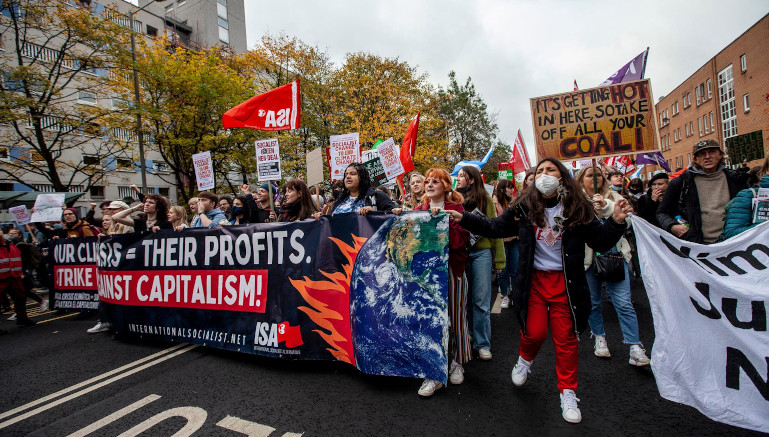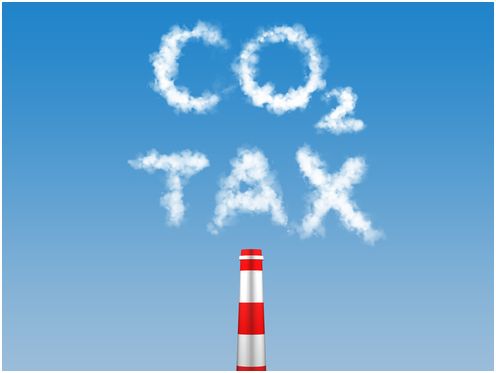After the millions of Covid-19 deaths, the climate crisis has brought additional death tolls last summer. Floods, forest fires and other extreme weather events dominated the news. To force real action we need to take to the streets! Indigenous women are showing us the way, marching in their thousands through Brazil’s capital on 10 September against renewed attacks from Bolsonaro’s government on their ancestral lands in the service of mining corporations and agribusiness.
Fighting to stop the continued destruction of the Amazon forest, they are defending the lives of their children, but also fighting against a system which makes more and more parts of the planet uninhabitable for all living creatures. We must follow their example: We need the biggest climate mobilisations ever leading up to and during COP26 in 2021. Socialist Feminists must be at the forefront of these mobilisations, because the fight against sexism goes hand in hand with the fight against the climate crisis.
Women are hit harder
The capitalist system relies on unpaid work that women do in the household. Part of this is providing for the upbringing and safety of children, a crucial task for capitalism, because children are the next generation of workers who will create profits for the 1%. This makes women more vulnerable to natural disasters and extreme weather conditions linked to the climate crisis. In emergency situations, women must not only save themselves but also their children, who may not yet be able to walk or swim. After the tsunami that hit Sri Lanka, Indonesia and India in 2004, Oxfam reported that for every three men who survived the disaster, only one woman survived.
Not only do women do a lot of unpaid housework, they are also over-represented in low-paid jobs: 70% of the 1.3 billion people living in poverty are women and 40% of households in urban regions are headed by a (single) woman. Anti-social ‘green’ measures such as water charges hit women harder economically, particularly working class and poor women, and so does the massive destruction caused by natural disasters, like Hurricane Ida that recently swept through the US. Women often have no, or very few, means to repair or rebuild their houses, let alone to pay for a well-insulated house or to take out proper insurance.
In addition, shelters after these disasters are often not well equipped to receive women either. After Hurricane Katrina swept through New Orleans, women were accommodated in a shelter that did not have enough sanitary products for the number of women staying there.
80% of the people forced to flee because of the effects of the climate crisis are women. They end up in refugee camps where people live in close quarters and women are very vulnerable to gender-based violence, human trafficking, etc. In a refugee camp in Pakistan, more than 79% of the 200 women surveyed experienced domestic violence. And 46% of women in European refugee camps said they felt unsafe.
A poorly paid job means that many women are financially dependent on their partner or family and do not have the means to escape from a situation of violence. The health and climate crises of capitalism make this a daily reality for more and more women. In periods of heightened tension, violence against women increases. Dehydration of agricultural land and access to less and less drinking water not only make women travel further to get access to these foods, but also leads them to eat less or not be fed at all because they are at the bottom of the ‘natural’ hierarchy. In other cases, women have to sell their bodies in exchange for food. A natural disaster is such a situation of increased tension. In Australia, domestic violence figures peak after forest fires, which are growing more intense and longer lasting due to the climate crisis.
Time for Action!
“We are at the beginning of a climate crisis and all you can talk about is money and fairy tales of eternal economic growth” — this is how Greta Thunberg unmasked the real climate killers in her speech to the UN in 2019. And that is what we must do again now! Because, just as sexism is not a problem that comes from individual men, global warming is not something caused by individual people. The whole system is to blame!
The climate movement, just like the feminist movement, needs to take to the streets again, organize big days of action and strikes. And as in 2019, women and socialist feminists must be at the forefront of this fight. The countries hardest hit by the climate crisis today are countries where women are already severely oppressed. The climate crisis is further reducing their chances of a liveable life.
To force real change, young people and working people, men and women the working class, youth and oppressed of all genders must fight together and organise themselves around a program of social demands that breaks with the logic of the profit system which is responsible for the climate crisis and also needs sexism to maintain its profits.
Socialist feminism means engaging in active struggle against all forms of oppression, including sexism, racism, homophobia, transphobia, and the oppression of indigenous peoples and national identities, and the divisive, cruel and chaotic capitalist system at its root. This struggle must be based on solidarity to strengthen the unity of the world’s working class so that together we can rescue humanity from dystopian disaster and build a world free of the oppression, violence, homelessness, poverty and obscene wealth inequality that characterises capitalism, where people of all genders can flourish.




